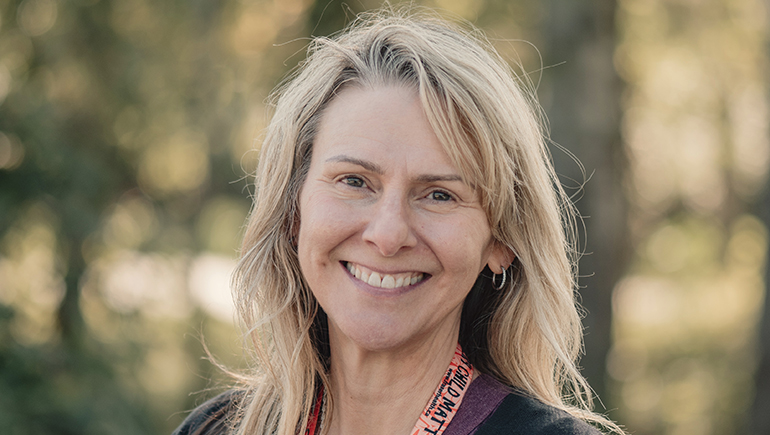
An Indigenous maternal liaison is helping Indigenous Life-Givers at Surrey Memorial Hospital have culturally appropriate birth experiences.
Photo: Katherine Bartel, Indigenous maternal liaison, Family Birthing Unit, Surrey Memorial Hospital.
At Surrey Memorial Hospital, a transformative initiative is supporting Indigenous Life-Givers in their childbearing journeys.
Funded by the Surrey Hospitals Foundation, Katherine Bartel works within the hospital’s Family Birthing Unit and the Neonatal Intensive Care Unit. As an Indigenous maternal liaison, she provides culturally appropriate support, advocacy and health information.
Previously a public health nurse for 20 years at the Guildford Health Unit, her role is breaking down barriers and expanding support networks for Indigenous families in the region.
In Indigenous cultures, childbirth is a significant life milestone – a profoundly sacred ceremony symbolizing one spirit, the mother, coming into two: mother and child.
“An institutionalized birth is set with policies and procedures and it can really limit access to the support our families need such as smudging, sacred medicine, pipe ceremony, singing and drumming in the birthing room with aunties, grandmas, cousins and sisters in attendance,” shared Elder True Thomas, a senior Indigenous cultural advisor at the Indigenous Health and Wellness Centre. “Birthing should be sacred, not medicalized. Giving birth should be your greatest experience, not your greatest fear.”
Katherine helps ensure that Life-Givers have culturally appropriate care journeys. She provides guidance to care providers on relevant cultural considerations around childbirth and presents Life-Givers with culturally meaningful gifts, including a blanket, a baby’s first abalone shell and feather, sacred medicines and a children’s book donated by the Surrey Library.
The Indigenous maternal liaison role was created to close gaps between Indigenous and non-Indigenous people in maternal and infant health outcomes.
Indigenous Life-Givers sometimes avoid seeking care due to a history of experiencing systemic racism and barriers to accessing medical assistance,. When they visit a hospital, they can feel stressed, anxious and scared.
“It was my work as a public health nurse that started me on my journey of caring for Indigenous families,” said Katherine. “It is the relationship building skills and community work from public health that I bring to inform the work I do now.”
Katherine walks alongside Life-Givers throughout their care journeys, helping connect them with Elders and other supports like case managers, physicians, nurses and social workers. She also partners with the Maxxine Wright Community Health Centre, Fraser Region Aboriginal Friendship Centre and our Population and Public Health programs – ensuring that Life-Givers have seamless, holistic and culturally appropriate experiences and friendly, familiar faces present when it's time to deliver their babies.


